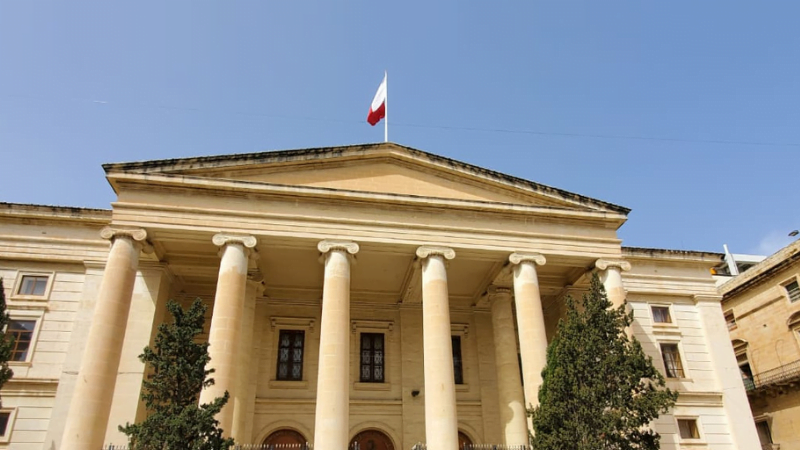Promised reform to the appointing and governing of specialised tribunals made by the Maltese government under the EU’s National Recovery and Resilience Plan (NRRP) has not borne fruit, and now a case has been filed against Industrial Tribunal members over lack of independence with the government adding fuel to the fire as it promises to cover their legal fees.
Over the weekend, a case was filed by the Union of Professional Educators against the Department of Industrial and Employment Relations, with the argument that as three tribunal members were appointed by government entities and held other public positions, they could not be considered independent or impartial.
Human rights advocacy NGO Aditus commented on the case, stating that “Just as our judicial appointment system was slammed by the Venice Commission in 2019, the appointment and removal procedures of members of tribunals directly by the executive cannot be considered to guarantee independence and impartiality.”
They continued that the situation would not have arisen if the government had made good on its pledge to “assess and change the method of appointment and governance of specialised tribunals by 2026 due to concerns about the lack of independence”.
Under the NRRP, Malta is set to receive hundreds of millions of euro in funds and grants, conditional on meeting various terms and conditions, including country-specific recommendations. The aim is to contribute to sustainable, equitable, green and digital recovery, embracing significant EU challenges.
One of the conditions agreed upon in 2021 is reforming the local institutional framework, including the independence of specialist tribunals, on which Aditus says the government is “dragging its heels”.
The pledge to ensure the independence of tribunals was also underlined in the 2023 Rule of Law report from the European Commision, which stated, “the government has committed in its Recovery and Resilience Plan to carry out a review of the independence of the specialised tribunals in communication with the Venice Commission,” adding that members are often appointed “through a procedure involving only the executive power.”
The tribunal had ruled against the union, denying it the right to represent learning support educators and to assist its members in collective bargaining procedures. The tribunal ruled that while the union represented most LSEs in state employment, this could not be considered a ‘separate bargaining unit’.
The union, represented by lawyers Jason Azzopardi and Therese Comodini Cachia, argued that the decision violated the right to representation. They also said that the three tribunal members, Harold Walls, Bryony Bartolo and Lawrence Mizzi, were appointed by the government, so they could not be considered independent.
As well as serving on the tribunal, Bartolo is a private practice lawyer and works part-time at the Malta Housing Authority.
Walls is chairman of the tribunal, a member of the Collective Bargaining Unit, and in a position at the government entity, the Malta Investment Management Company Limited.
Mizzi held several senior positions in Air Malta and its subsidiary companies.
Walls, Bartolo and Mizzi then sent a letter to the president, prime minister, and parliamentary secretary for social dialogue. They claimed it was a personal attack and asked for “protection, help and assistance”.
“In this particular case, we declare that we always exercised our function throughout the proceedings in an independent, impartial, and integral manner,” they said.
They added that they had no reason to abstain, and the union had not asked them to recuse themselves.
It is unacceptable, they argued, that whenever a party disagrees with a tribunal decision, members are “personally targeted”, adding judges and magistrates are not personally sued for decisions they take in court, which should also apply to members of a tribunal.
Adding fuel to the fire of claims that the tribunal lacked independence, the government confirmed it would indeed support them. Parliamentary Secretary Andy Ellul said the government cannot accept that those who serve the country are personally attacked in court.
“This is an unjust and disproportionate attack,” he added, stating the government would assist the tribunal member’s legal expenses. A controversial statement that raised questions about the independence of tribunal proceedings.
Ellul added that the tribunal chairman had been in his position for 25 years, reappointed by both Nationalist Party and Labour Party administrations.
Comodini Cachia responded to the government’s criticism of the court case, calling it “harassment” and referencing an article from Labour Party media, ONE, which she said, “claims that lawyers signing a human rights claim are terrifying the authorities by simply opening human rights proceedings.”
“What a tragic, sorry state my country is in; run by a government incapable of enabling a safe environment for participation in public debate and instead actively harassing those holding it to account by using the divisive partisan tactic of ‘with us or against us’,” the former MP said.














Bryony Bartolo is not only not independent she is an incompetent